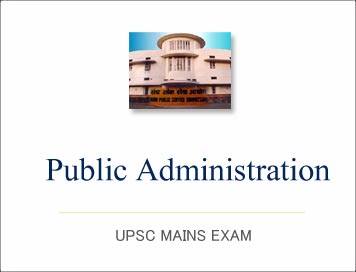Public Administration Mains 2017 : Solved Paper Question Paper-1 (Question-4)

Public Administration Mains 2017 : Solved Paper Question Paper-1 (Question-4)
(Section A)
Q4)a) “With every major transformation in the applied world of Public Administration , the study of Public Administration has grown in scope and intensity.” Discuss the relationship between the evolution of the discipline and profession of Public Administration .(15 marks) (Introduction)
ANSWER:Public
Administration as an independent and separate subject of study began in 1887. In
order to understand the profession of the discipline as a field of inquiry it
becomes essential to study its evolution.
Some of them have discussed it from the point of view of traditions such as
Absolutist, Liberal - Democratic and Marxian. The absolutist tradition
anticipates the liberal democratic and Marxian traditions. Administrative
traditions in places where absolute power was concentrated in the monarch can be
termed absolutist. In Indian history the earliest work dealing with the
absolutist tradition is Kautilya’s Arthashastra. Woodrow Wilson’s essay entitled
‘The Study of Administration’, identified for understanding the evolution of the
subject within the broad paradigm of liberal democracy. Marxist interest in the
bureaucracy, organisation and management became pronounced only in the decade
following the Second World War.
Golembiewski may be understood in terms of locus and focus. To him locus is the
institutional ‘where‘ of the field while focus is the specialized ‘what‘ of the
field. On this basis, he has outlined the following four developmental phases of
Public Administration:
Phase I: The analytic distinction of politics from administration.
Phase II: The concrete distinction of politics from administration.
Phase III: A science of management.
Phase IV: The pervasive orientation toward public policy.
Nicholas Henry in his book entitled “Public Administration and Public Affairs”
has explained the evolution of the discipline keeping in view its definitional
crisis into following five successive paradigms:
Paradigm I: The politics/Administration Dichotomy, 1900-26
Paradigm II: The Principles of Administration, 1927-37
Paradigm III: Public Administration as Political Science, 1950-70
Paradigm IV: Public Administration as management, 1956-70, and
Paradigm V: Public Administration as Public Administration, 1970- Till Now
b)”Systems Theory” in essence is not a theory , but an approach to the study of administrative phenomena .” Comment (15 marks) (Organisations)
ANSWER:A
system is an entity with interrelated and interdependent parts; defined by its
boundaries and it is more than the sum of its subsystem. Changing one part of
the system affects other parts and positive growth and adaptation of a system
depend upon how well the system is adjusted with its environment, and systems
often exist to accomplish a common purpose that aids in the maintenance of the
system.
A system can be defined as an entity, which is a coherent whole such that a
boundary is perceived around it in order to distinguish internal and external
elements and to identify input and output relating to and emerging from the
entity. A systems theory is hence a theoretical perspective that analyzes a
phenomenon seen as a whole and not as simply the sum of elementary parts.Systems
thinking comes from the shift in attention from the part to the whole ,
considering the observed reality as an integrated and interacting unicum of
phenomena where the individual properties of the single parts become indistinct.
Under systemic perspective, instead need to apply a global vision to underline
its functioning. Although we can start from the analysis of the elementary
components of a phenomenon, in order to fully comprehend the phenomenon in its
entirety we have to observe it also from a higher level: a holistic perspective.
